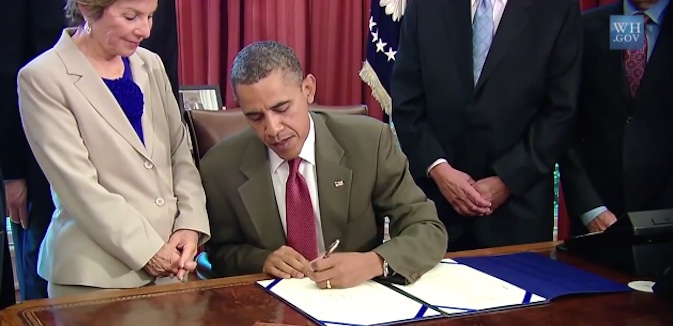President Barack Obama on Friday signed into law legislation – previously passed unanimously by both the House and the Senate – that would among other things prohibit Iran’s pick for its next U.N. ambassador from entering the United States. Hamid Aboutalebi was a member of the Muslim Student Followers of the Imam’s Line in 1979 when the group seized scores of Americans inside the U.S.’s Tehran embassy, and the revelation that he had been appointed by Tehran prompted quick action in Congress to bar him.
Politico covered the bill last Friday, highlighting it as a sign of increasingly rare bipartisanship in DC:
Sen. Ted Cruz’s bill to forbid an Iranian diplomat from entering the U.S. got President Barack Obama’s signature Friday, though the president noted he still considers the law “advisory.”
The law spearheaded by the typically polarizing Texas Republican was a rare moment of consensus in D.C.: Obama’s sign-off follows unanimous passage in the Senate and House last week.
The bill would tweak existing law to prohibit entry to the U.S. to anyone who has engaged in terrorist activity against the U.S. or its allies in the past, a move triggered by Iran’s selection of Hamid Aboutalebi, who was involved in the 1979 taking of Americans hostage in Tehran, as its U.N. ambassador.
The issue is politically and diplomatically complicated for the White House.
Domestically, administration officials fighting against Congressionally imposed pressure on Iran have leaned heavily on the argument that it is critical for the U.S. to maintain a positive diplomatic atmosphere to avoid hampering ongoing nuclear talks. Appointing a figure linked to the embassy hostage crisis to a U.S.-based post has been taken as a sign that the Iranians do not perceive themselves as similarly constrained.
Internationally – per Washington Institute Managing Director Michael Singh – accepting the perceived Iranian slight and allowing Aboutalebi to take up his post would “reinforce the impression among regional allies that Washington is willing to ignore Iranian misbehavior in [the] pursuit of a nuclear accord.”
Iran has indicated that it will not consider any alternatives to Aboutalebi, and earlier this week it requested that the U.N.’s Committee on Relations with the Host Country meet to address the issue:
“This decision of the US government has indeed negative implications for multilateral diplomacy and will create a dangerous precedence and affect adversely the work of intergovernmental organizations and activities of their Member-States,” Iran’s Deputy UN Ambassador Hossein Dehghani wrote to the UN Committee on Relations with the Host Country.”It requires to be well addressed in the Committee on Relations with the Host Country. The Permanent Mission of the Islamic Republic of Iran requests that the committee addresses this issue in an extraordinary and urgent manner,” he said.
[Photo: The White House / YouTube ]




